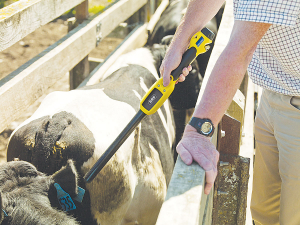MPI Hails Kiwifruit Boom as Horticulture Revenue Surges Past $9 Billion
Ministry for Primary Industries (MPI) Director General Ray Smith is giving a big shout-out to the horticulture sector, especially kiwifruit.
 MPI says it's important for farmers to do the right thing because biosecurity is critically important to the agricultural sector.
MPI says it's important for farmers to do the right thing because biosecurity is critically important to the agricultural sector.
A Hawera farmer is one of several farmers who has recently been convicted for failing to register his animals under the National Animal Identification and Tracing (NAIT) scheme.
Ross Gordon Clark was fined $20,000 in the Hawera District Court, after earlier pleading guilty to seven charges under the NAIT Act, for not registering 106 cows between May and July 2020.
Meanwhile, Waitui farmer Victor Charles McIntyre pleaded guilty to 19 charges under the NAIT Act and was fined $18,900 in the New Plymouth District Court for not registering 175 cattle between April and September 2020.
The Ministry for Primary Industries (MPI) has recently secured two additional NAIT convictions which are awaiting sentencing.
The NAIT scheme enables MPI to track and trace cattle and deer when they are moved between farms or for processing. It's a critical factor in our ability to act quickly and decisively in response to biosecurity threats that could have devastating effects for New Zealand.
In December 2019, Parliament increased the penalty for non-registration tenfold, meaning the maximum fine was increased from $10,000 to $100,000 and these fines are the first under the updated penalties.
MPI regional manager of Animal Welfare and NAIT Compliance Joanna Tuckwell says it's important for farmers to do the right thing because biosecurity is critically important to the agricultural sector.
"We certainly take it very seriously and the increase in fines shows Parliament does too. The higher penalties under the new regime reflect the seriousness of the situation," Tuckwell says.
"People in charge of NAIT animals need to get this right. When they don't they potentially put the whole sector at risk if a biosecurity matter involving farm animals was to occur."
Fonterra’s impending exit from the Australian dairy industry is a major event but the story doesn’t change too much for farmers.
Expect greater collaboration between Massey University’s school of Agriculture and Environment and Ireland’s leading agriculture university, the University College of Dublin (UCD), in the future.
A partnership between Torere Macadamias Ltd and the Riddet Institute aims to unlock value from macadamia nuts while growing the next generation of Māori agribusiness researchers.
A new partnership between Dairy Women’s Network (DWN) and NZAgbiz aims to make evidence-based calf rearing practices accessible to all farm teams.
Despite some trying circumstances recently, the cherry season looks set to emerge on top of things.
Changed logos on shirts otherwise it will be business as usual when Fonterra’s consumer and related businesses are expected to change hands next month.

OPINION: Here w go: the election date is set for November 7 and the politicians are out of the gate…
OPINION: ECan data was released a few days ago showing Canterbury farmers have made “giant strides on environmental performance”.